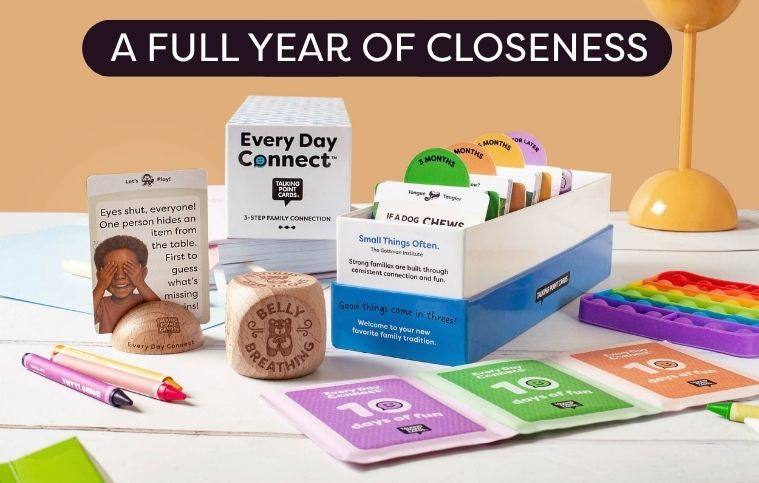SHOP
About
Golden Oldies
How to Have Old-School Family Evenings in the Modern Day

Remember those cozy family nights from back in the day? The ones where everyone gathered around, maybe played some board games, and actually talked to each other? Yeah, those seem like ancient history now. But here's a crazy idea - what if we could bring them back?
In today's hyper-connected yet somehow disconnected world, the art of family bonding is becoming a lost relic. We're all so busy staring at our screens that we've forgotten how to look each other in the eye and have a real conversation. But fear not, dear reader! This guide is here to help you dust off those old-school family evening traditions and give them a modern twist.
Why Bother with Family Evenings Anyway?
Before we dive into the "how", let's talk about the "why". Why should you care about reviving these quaint old traditions? Well, buckle up, because I'm about to hit you with some cold, hard facts:
-
Family bonding time is crucial for child development. Studies show that kids who spend quality time with their families have better social skills, higher self-esteem, and are less likely to engage in risky behaviors.
-
Regular family interactions can improve communication skills for everyone involved. It's like a gym for your social muscles!
-
Shared experiences create lasting memories and strengthen family bonds. These are the stories you'll be telling (and possibly embellishing) for years to come.
-
Taking a break from screens can reduce stress and improve mental health. Who knew that putting down your phone could actually make you feel better?
-
Family evenings can be a great opportunity to teach life skills and values in a fun, informal setting.
So now that we've established why family evenings are awesome, let's get into the nitty-gritty of how to make them happen in our modern, tech-obsessed world.

Setting the Stage: Creating the Right Environment
First things first - you need to set the mood. And no, I don't mean dimming the lights and putting on some Barry White (although if that's your family's jam, who am I to judge?).
Here's how to create an environment conducive to good old-fashioned family bonding:
1. Declare a "No-Tech Zone"
This is probably gonna be the hardest part. But trust me, it's worth it. Set a rule that for a certain period each week (let's say, two hours on a Wednesday evening), all screens go off. Phones, tablets, laptops, TVs - they all get the boot.
You might face some resistance at first. There might be tears. There might be tantrums. And that's just from the adults! But stay strong. The withdrawal symptoms will pass, I promise.
2. Create a Cozy Space
Now that you've pried everyone away from their devices, you need to give them somewhere comfy to hang out. Maybe it's the living room, maybe it's a blanket fort in the backyard. The key is to make it inviting and comfortable.
Throw in some pillows, some blankets, maybe even some of those twinkly fairy lights if you're feeling fancy. The goal is to create a space that says "Hey, come hang out here and talk to each other!"
3. Set the Mood with Music
Nothing sets the tone quite like some good background music. Choose something that everyone enjoys, but keep it low enough that it doesn't interfere with conversation. Maybe dust off that old record player and introduce the kids to the wonders of vinyl!
Let's Get This Party Started: Activities to Get Everyone Talking
Alright, so you've set the stage. Everyone's gathered in your cozy tech-free zone, looking at each other awkwardly and wondering what to do with their hands now that they can't scroll through social media. It's time to break the ice and get the conversation flowing!

1. Break Out the Board Games
Board games are the ultimate old-school family activity. They're fun, they're interactive, and they give you plenty of opportunities to accuse your loved ones of cheating. Some classics to consider:
-
Monopoly (warning: may cause family feuds)
-
Scrabble (perfect for expanding vocabularies)
-
Trivial Pursuit (show off your useless knowledge!)
-
Pictionary (great for laughs, not so great for aspiring artists)
2. Storytelling Time
Remember when people used to, you know, tell each other stories? Let's bring that back! Here are some ideas to get the storytelling juices flowing:
-
Family History Night: Have older family members share stories about their childhoods or family ancestors. It's like a real-life version of "Who Do You Think You Are?", minus the celebrity budget.
-
"Two Truths and a Lie": Each family member tells three stories about themselves - two true, one false. The rest of the family has to guess which is the lie. It's a great way to learn new things about each other (and discover who the best liars in the family are).
-
Story Chain: Start a story with one sentence, then go around the room with each person adding a sentence. By the end, you'll have a weird and wonderful tale that you've created together.
3. Get Crafty
Nothing brings people together quite like making a mess, I mean, creating art together. Some ideas:
-
Family Scrapbooking: Go through old photos and create a family scrapbook together. It's a great way to reminisce and create something lasting.
-
DIY Projects: Build a birdhouse, make friendship bracelets, or create a family time capsule. The possibilities are endless!
-
Cooking or Baking: Food brings people together. Try out a new recipe as a family, or have a bake-off competition. Bonus: you get to eat the results!
Keeping the Conversation Flowing: Communication Skills 101
So you've got everyone in one place, engaged in an activity. Great! But how do you keep the conversation going? How do you make sure it's not just awkward silences punctuated by the occasional "Can you pass the popcorn?"
Here are some tips to keep the chatter flowing and improve those all-important communication skills:

1. Ask Open-Ended Questions
Instead of asking yes/no questions, try to ask ones that require more thought and elaboration. For example:
-
Instead of "Did you have a good day at school?", try "What was the most interesting thing that happened at school today?"
-
Instead of "Do you like your job?", try "If you could change one thing about your job, what would it be and why?"
2. Practice Active Listening
This means really paying attention to what others are saying, not just waiting for your turn to talk. Some tips:
-
Make eye contact
-
Nod and use other non-verbal cues to show you're listening
-
Summarize what you've heard to show understanding
-
Ask follow-up questions
3. Use "I" Statements
When discussing potentially sensitive topics, use "I" statements to express your feelings without sounding accusatory. For example:
-
Instead of "You never help around the house", try "I feel overwhelmed when I have to do all the housework alone"
-
Instead of "You're always on your phone", try "I feel ignored when we're together and you're on your phone"
4. Embrace the Silence
Not every moment needs to be filled with talking. Sometimes, comfortable silences can be just as bonding as conversation. Don't feel pressured to fill every gap - enjoy the quiet moments too.
Keeping It Fresh: Mixing Things Up
Alright, so you've mastered the art of the old-school family evening. You're playing board games, telling stories, and actually talking to each other like it's 1955. But how do you keep it from getting stale? How do you prevent your kids from saying "Ugh, not ANOTHER family night"?
Here are some ideas to keep things fresh and exciting:
1. Theme Nights
Each week, have a different theme for your family evening. Some ideas:
-
International Night: Choose a country and base your activities, food, and even clothing around it. It's like travelling the world without leaving your living room!
-
Decade Night: Pick a decade and go all out. 80s night? Break out the neon and the Rubik's cube. 50s night? Time for milkshakes and sock hops.
-
Superhero Night: Everyone dresses as their favorite superhero and you watch a classic superhero movie together.
2. Role Reversal Night
For one night, flip the family dynamics on their head. Kids get to make the rules (within reason, of course - we don't want total anarchy), parents have to ask permission to do things. It's a fun way to gain some perspective and have a few laughs.
3. Mystery Night
Turn your family evening into a real-life game of Clue. Set up a mystery for the family to solve together. You could do a scavenger hunt with clues leading to a "stolen" family heirloom, or stage a (fake) crime scene and have everyone play detective.
4. Talent Show Night
Everyone in the family has to perform a talent - whether it's singing, dancing, telling jokes, or demonstrating their ability to burp the alphabet. It's a great way to encourage creativity and maybe discover some hidden talents!

The Grand Finale: Making It a Lasting Tradition
So you've done it. You've successfully dragged your family away from their screens and into the wonderful world of face-to-face interaction. But how do you make sure this becomes a lasting tradition and not just a one-time thing?
Here are some tips to keep the momentum going:
-
Consistency is Key: Try to have your family evenings at the same time each week. It helps to establish it as a routine.
-
Get Everyone Involved in Planning: Take turns letting different family members choose the activities for each week. This gives everyone a sense of ownership and excitement.
-
Document the Fun: Take pictures or videos of your family evenings (yes, you can briefly un-ban technology for this). Create a scrapbook or digital album to look back on.
-
Be Flexible: If something's not working, change it up. The goal is to have fun and bond as a family, not stick rigidly to a set of rules.
-
Lead by Example: Parents, this one's for you. Show enthusiasm for family time. If you're excited about it, your kids are more likely to be too.
In our fast-paced, technology-driven world, it's easy to forget the simple joys of face-to-face interaction. But by making a conscious effort to unplug and spend quality time together, we can strengthen our family bonds, improve our communication skills, and create lasting memories.
So go ahead, declare a "No-Tech Zone", dust off those board games, and get ready for some good old-fashioned family fun. It might feel a bit awkward at first, but stick with it. Before you know it, you'll be wondering why you ever thought scrolling through social media was more fun than beating your dad at Monopoly or hearing Grandma's stories about "the good old days".
Remember, the family that plays together, stays together. And in a world where it's all too easy to drift apart, that's more important than ever.
Now if you'll excuse me, I have a heated game of Uno to get back to. I think my 8-year-old is cheating, but I can't prove it yet...
LIKED THIS ARTICLE?
SIGN UP FOR MORE!






